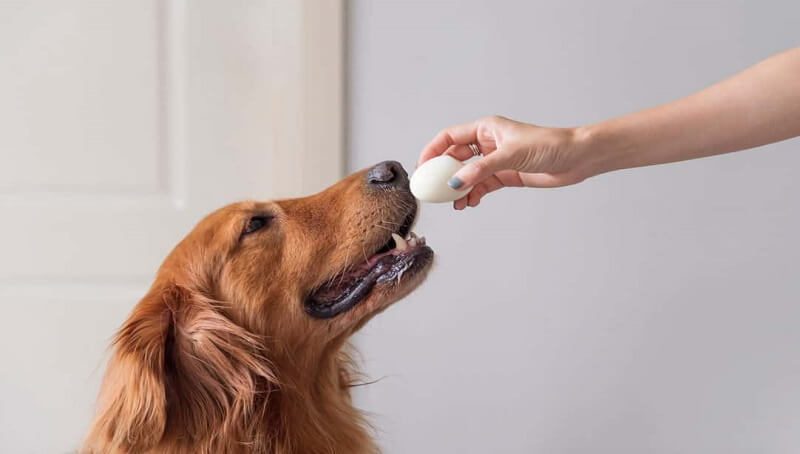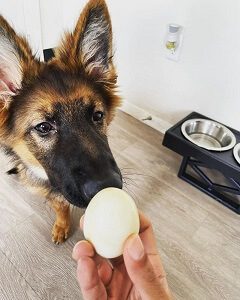
The Largest Dog in the World – What Was His Name?
June 7, 2022
Can Squirrel Monkeys Be Kept as Pets?
June 8, 2022
Breakfast is the most important meal of the day, and eggs are a cheap, nutritious option that will help you start your morning. But when your furry pet starts looking at the omelet or fried eggs, you may wonder whether it is safe to let your quadruped friend eat eggs with you.
The short answer is yes. Whether cooked or boiled, eggs can be a delicious reward or dietary supplement for your dog. So, dogs can eat boiled eggs.
Make sure you don’t give your dog eggs that are seasoned with additives like salt or omelet that contains onions or other potentially harmful ingredients. Also, make sure that the eggs do not contain other additives such as oil, butter, or pepper, which can be harmful to your dog.
Your dog has simple tastes and will most likely devour to the last bite of eggs in its bowl, without any spice. However, a drop of cheese sprinkled on the eggs would make the reward even more special.
The benefits of eggs in dogs
Eggs are rich in protein, numerous amino acids, essential fatty acids, vitamins (such as A and B12), folic acid, iron, selenium, and riboflavin that can provide a number of health benefits for a dog. All of this can improve the health of its skin and fur, teeth, and bones.
You might also like my articles on whether dogs should eat quail eggs, Alfredo sauce, or spicy food.
Eggs are an ingredient used in many homemade diets for pets and are considered safe and nutritious for most dogs.
Eggs can be safely incorporated into your dog’s diet; however, they should never become their main source of nutrition.
Generally, eggs should be consumed in moderation several times a week when used as a supplement to high-quality commercial foods or on a meat-based diet.
Can puppies eat hard-boiled eggs?
A puppy should never eat raw eggs while eating hard-boiled eggs is much safer. Although, until it turns 12 weeks, the puppy’s body isn’t ready to digest the protein found in eggs, so it is best to wait for a little and offer it gradually.
Can elderly dogs eat hard-boiled eggs?
You can feed your older dog hard-boiled eggs, but take into account the fact that it can no longer digest the food as well as when it was young. It is true that eggs are rich in nutrients and have many benefits for older dogs too that’s why you can offer it half a yolk from time to time.
Can dogs with diarrhea eat hard-boiled eggs?
First of all, you’ve got to make sure that diarrhea in your dog is not due to salmonella poisoning, because if it is, you mustn’t give your dog eggs. If it is not, you can give it hard-boiled eggs because they can help it recover faster from gastrointestinal upset, due to their high protein level.
Can dogs eat hard-boiled egg yolk?
Those who want to have a healthy animal should occasionally give it an egg yolk. It can be mixed with raw or boiled food. Egg yolk contains vitamins, trace elements, and proteins, and it is good for the body but also for the animal’s fur. The dog must eat meat and vegetables, but once a week instead of meat you can give it a hard-boiled egg.
Avoid feeding it egg whites
Raw protein, on the other hand, is absolutely taboo for dogs.
To understand this, let’s dig a little. Egg white contains the substance named avidin. This substance also prevents the absorption of biotin. However, for dogs, biotin is an extremely important vitamin, also known as vitamin H or vitamin B7.
If there is a deficiency, then the result will be a disturbed metabolism. A biotin deficiency is usually visible first in the fur. The structure of the fur is deteriorating, and it becomes shaky and dull.
Itching and redness of the skin also occur. If biotin deficiency persists, it can lead to serious diseases.
The solution, however, is very simple because the avidin contained in the egg white can be easily deactivated by heating.
The egg shell is also valuable
But not only the interior of a chicken egg is important for dogs. You can also use the shell because egg shells contain a lot of calcium, which is important for dogs.
Take the eggshells and grind them in a mortar or food processor, then sprinkle a little over the food from time to time.
However, always make sure that the shells are clean. Dirty soil shells or poop can contain numerous bacteria, which is dangerous for both humans and animals. It is best to use the shells of boiled eggs.
How often should dogs eat hard-boiled eggs?
The recommended amount of eggs per week depends on the weight of the dog – thus, for a small dog, like Chihuahua, Pekinese, etc., 1-2 eggs are enough. A medium-sized dog, like cocker spaniel, beagle, basset, etc., can eat up to 3-4 eggs per week. And a large dog, like a German dog, German shepherd, etc., can have a daily or almost daily egg in the food ration.
Can pregnant dogs eat hard-boiled eggs?
Hard-boiled eggs are safe to offer a dog during pregnancy or while nursing. Offering it just half a yolk will provide it with sufficient nutrients.
Anyway, it is very important not to overfeed them as egg yolks are high in cholesterol and may cause problems, due to the hormonal changes in the body.
The dangers of eggs in dogs
 In history, dogs were known to steal from birds’ nests and eat eggs completely raw, including the shell, but of course, it is not recommended for today’s domestic pets.
In history, dogs were known to steal from birds’ nests and eat eggs completely raw, including the shell, but of course, it is not recommended for today’s domestic pets.
Eating raw or non-fully cooked eggs carries inherent risks to your pet, just as it does in humans, and while these side effects can be relatively rare, veterinarians recommend cooking the eggs before feeding them to your dog.
Both dogs and humans are at risk of getting diseases like salmonella from raw eggs. It is a food-borne disease that both animals and people can get from raw eggs or contaminated dairy products. Salmonella can manifest in your pet with symptoms such as vomiting, fever, diarrhea (which could be bloody), loss of appetite, or decreased activity level.
Pets with cancer, infections, or other serious health problems should avoid raw eggs in particular, as their immune system will not be able to cope with the risk of potential contamination.
Another lesser-known danger that can be caused by prolonged ingestion of raw egg whites is biotin deficiency, which is caused by an enzyme in egg whites that prevents the absorption of biotin in the body.
Biotin is a B-complex vitamin that promotes healthy skin, metabolism, digestion, and cell creation in dogs. Because egg whites contain these enzyme inhibitors that can interfere with digestion, especially in puppies and older dogs, eggs should always be given in moderation.
Although it most likely takes an excessive amount of eggs to cause a biotin deficiency in your dog, veterinarians still warn you not to overdo it.
Monitor your pet for any signs of stomach discomfort to make sure your quadruped friend can tolerate snacks with hard-boiled eggs without any problems.
Eggs are a great way to supplement your dog’s diet. You’ll give them a brighter coat, healthy bones, and more by adding this ordinary food to your pet’s weekly diet.
